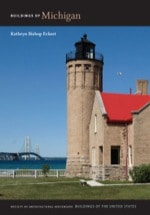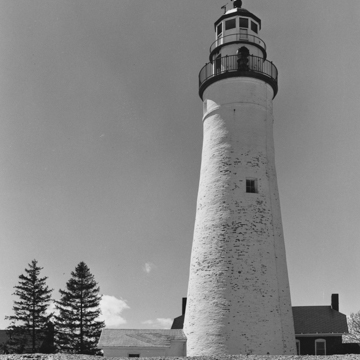Located at the confluence of Lake Huron and the St. Clair River, this lighthouse was the first built on Lake Huron and is the oldest standing in Michigan. The present light replaces one erected in 1825 but destroyed by a storm in 1828. It is a white-painted, conical, brick tower built by Lyon (1800–1851), an engineer and land surveyor who worked for the U.S. Surveyor General. In 1861 the light was raised twenty feet to its present height of eighty-six feet. Representative of early light stations, the double lightkeeper's house, built in 1874–1875, stands next to the light tower. It is a plain red brick two-story house capped by a jerkinhead roof. Awaiting a structural assessment and repairs, the lighthouse closed to visitors in 2008. In 2010 the light station transferred to St. Clair County, which, in partnership with the Port Huron Museum, will manage and use it. Huron, a floating lightship (launched 1920, Consolidated Shipbuilding Corporation) aided transportation on the Great Lakes. It was assigned to Lake Huron station in 1936, decommissioned in 1970, and moved in 1971 to Pine Grove Park. It is a National Historic Landmark.
You are here
Fort Gratiot Lighthouse
If SAH Archipedia has been useful to you, please consider supporting it.
SAH Archipedia tells the story of the United States through its buildings, landscapes, and cities. This freely available resource empowers the public with authoritative knowledge that deepens their understanding and appreciation of the built environment. But the Society of Architectural Historians, which created SAH Archipedia with University of Virginia Press, needs your support to maintain the high-caliber research, writing, photography, cartography, editing, design, and programming that make SAH Archipedia a trusted online resource available to all who value the history of place, heritage tourism, and learning.















